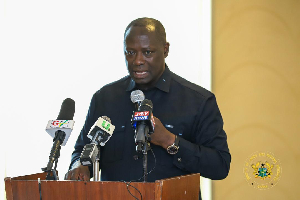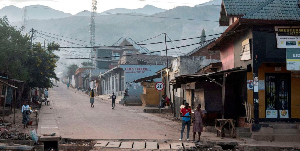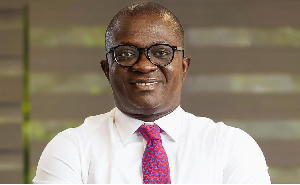Ghana Expo 2003, the four-day fair held at Alexandria Palace, London, aimed at exposing and advertising Ghana to the outside world, especially British and other European investors, did not achieve its purpose.
It was organised by a group calling itself Expo Africa, and claiming to be a British Company with a Ghanaian subsidiary. The fair which consisted of an investment seminar was also to exhibit Ghanaian products to the United Kingdom market, to attract new customers for such product.
The United Kingdom comprises of England, Scotland, Wales and Northern Ireland. All these territorial areas are covered by the British Broadcasting Corporation’s (BBC) television and radio networks. Regrettably, not a single advert was carried on either its World Service or the territorial networks; nor a single newspaper advert carried in any of the major newspapers, even though the organiser made prospective exhibitors believe that the event has been widely publicised.
The only advertisements made were the few announcements made on Hot FM, a Ghanaian local FM station, which is received by only a small segment of North London, and listened to mainly by Ghanaians.
Though the Ghana High Commission in London appeared to have been involved, the organisers never bothered to advertise the fair. Incredibly, it is estimated that over 700 visas were issued by the British High Commission in Accra. The question is, who were the recipients of these visas and where were they during the fair.
But the most disturbing aspect of the whole affair is that for those genuine businesses which spent huge sums to participate in the fair with the view to attracting customers from the UK, the least one can say about them is that they were duped and defrauded by the organisers. There were no foreign customers to be attracted because nobody knew about the fair, apart from some Ghanaians who are reached by Hot FM and those who learnt from friends. But who says those Ghanaians were there to either buy or transact business with the exhibitors? For some us living outside the reach of the Hot FM, it was through our usual regular contacts with those in London that we learnt about the fair.
It is important to note that much as Ghana needs to attract investors, the government and its ministers should be wary of such dubious organisations and characters who would want to throw dust into their eyes and deceive the Ghanaian public and business community.
What we need to ask is whether the Ghana High Commissioner, Isaac Osei and his staff, did any homework about the organisational background of the organisers before throwing the support of the Commission behind them? And whether he was satisfied with the outcome of the whole event, for which he moved the Vice President, Alhaji Aliu (considering the cost involved) and the Asantehene and some ministers of state to London?
Much as one could blame the organisers, it is also appropriate that Ambassador Osei and his staff be sanctioned for woefully failing to do their homework. What then is the use of our missions and our ambassadors and their staff if they would only compromise their position of seeking the interest of the ordinary Ghanaian, and seem to be conniving with dubious characters to defraud Ghanaians?
As usual, the High Commissioner, and the Ghanaian officials in London and Ghana who were involved in given approval to the fair would jump to a defence that such exhibitions are not meant for sales, and that results follow later. Sadly, this does not hold any water in this case, as there were no marketing and effective business deals which could be followed up later. Just ask the exhibitors, and they will confirm this.
The Ghana Expo 2003 should be an eye opener to our Ghanaian business community. People should therefore try and investigate the backgrounds of fair organisers before they attempt to participate in such ‘international fairs’. A lot of the Ghanaian exhibitors who spent thousands of hard-earned pound sterling openly complained about the poor organisational ability of the organisers, and the fact that they were deceived and defrauded. At the same time some Ghanaians living in London who visited the fair grounds decried the shame brought to the country and called on the government to investigate.
The Ghana Investment Promotion Centre (GIPC), which sent its officials to the fair, should have also known better. After all it is the state agency responsible for promoting investment, and since fairs are one way of promoting investment, the centre should have concerned itself with finding out who organisers were and what kind of preparation they have made to actually attract investors to Ghana at the fair.
It seems the GIPC rather concerned itself with its officials flying to London than to see to the interest of the Ghanaian exhibitors. Would it not have been appropriate, for the GIPC to undertake an independent investigation of the entire planning and programme of the fair, far in advance before the government committed itself?
It seems to me that most of the country’s missions are still packed with officials who are actually not needed, and those needed rather left out. How many of our missions have trade attaches and investment attaches (real experts?), and how many of them have professional press and information attaches who would at such occasions realise the import of publicity and ensure that such an event involving the Vice President are properly and well advertised and publicised?
In this time and age, business and investment promotion must be seen as real job which needs expertise at all levels, and if Ghana is to acquire a fair share of the global market, then it was time our foreign missions were properly staffed and oriented so as to avoid such shameful fairs such as the so called Ghana Expo 2003 which did not expose nothing about Ghana to anybody.















